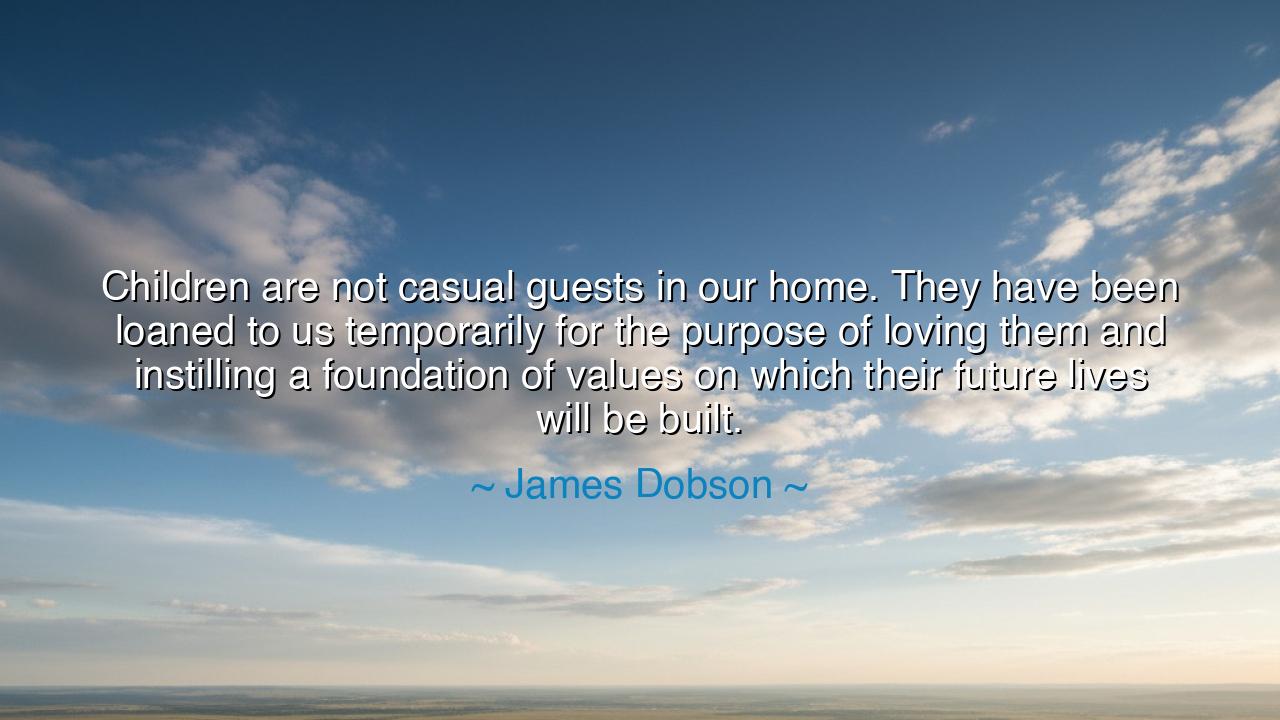
Children are not casual guests in our home. They have been
Children are not casual guests in our home. They have been loaned to us temporarily for the purpose of loving them and instilling a foundation of values on which their future lives will be built.






James Dobson, with the gravity of a teacher and the tenderness of a father, once declared: “Children are not casual guests in our home. They have been loaned to us temporarily for the purpose of loving them and instilling a foundation of values on which their future lives will be built.” In these words lies a sacred reminder of stewardship—that children are not possessions, nor ornaments to our pride, but living souls entrusted for a season. They are loaned, not owned; they are placed in our care not to indulge our ambitions, but to be formed in love and virtue for the journeys that await them.
The origin of this thought reaches back to ancient understandings of the family. In many traditions, from the Hebrews to the Greeks, children were seen as both gifts of the divine and responsibilities of the parent. They were not meant to remain forever in the household, but to be prepared—like arrows shaped for the bow, or seedlings tended for the field—to go forth into the world. Dobson, speaking from the vantage of modern faith and family, echoes this ancient vision: the parent is a guardian, not the owner, and the home is the first temple where values are inscribed upon the heart.
History offers us many examples of this truth. Consider Susanna Wesley, mother of John and Charles Wesley, whose teachings at the hearth shaped not only her sons, but the Methodist movement that would touch millions of lives. She did not treat her children as passing visitors but invested her hours in prayer, teaching, and discipline, building within them a foundation of faith and resilience. Her legacy shows the truth of Dobson’s words: what a parent instills today may guide nations tomorrow.
The image of children as temporary guests also reminds us of the fleeting nature of childhood. Days pass quickly, and the years when a child sits under the roof of the parent vanish like morning mist. Those years cannot be reclaimed. To waste them in neglect or distraction is to squander the chance to build the values that will sustain the child for a lifetime. Dobson calls us, therefore, to urgency—to see parenting not as a casual role, but as the most serious stewardship entrusted to human hands.
There is also a hidden call to humility in this teaching. To say that children are “loaned” is to confess that they ultimately belong not to us, but to God, to life, to destiny. Parents must therefore release the temptation to mold them into mirrors of themselves. Instead, they are called to love, to nurture, and to provide a strong foundation of values—honesty, courage, compassion, reverence—upon which each child may build a unique life. Just as a builder lays a foundation but does not dictate the shape of the house that will rise, so must parents trust the unfolding of their children’s futures.
The lesson for future generations is clear: treat children not as casual guests, nor as burdens, nor as possessions. See them as sacred trusts, as travelers passing through your home on the way to their own destiny. Fill their days with love, discipline, and the teaching of values, for those seeds will grow long after your presence has faded. Your role is not eternal, but the effects of your care are.
Practical wisdom flows from this truth. Be intentional in the time you spend with your children. Teach them with patience, model the virtues you desire them to live, and remember that every word spoken and every act shown is shaping their foundation. Do not delay, for the years of stewardship are short. And when the time comes, release them with blessing, knowing that you were faithful in your trust.
Thus, James Dobson’s words, simple yet profound, become a torch of ancient wisdom for the modern age. Children are not ours to keep, but ours to love, to teach, and to prepare. If we honor this stewardship with reverence, their lives will carry the mark of our love into eternity, and the values planted in their youth will bear fruit for generations yet unborn.






AAdministratorAdministrator
Welcome, honored guests. Please leave a comment, we will respond soon